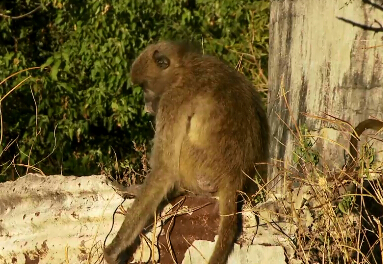Scientists are helping South Africa track a band of persistent criminals: baboons.
科學家正在幫助南非追蹤一群持久的罪犯:狒狒。
South Africa's baboon population is feeling the pressure of a shrinking habitat. With fewer traditional food sources available, the animals have resorted to stealing food from nearby humans. They raid homes, gardens and trash. Some even approach cars and steal food right out of people's hands.
南非狒狒種群正面臨棲息地萎縮的壓力。由于傳統食物來源越來越少,狒狒們不得不從附近的居民那里偷食物。他們突襲房屋,花園和垃圾。有些狒狒甚至接近汽車,從人們手中偷取食物。
A team of researchers has developed a tracking collar. It allows them to monitor the baboons' behavior and track their movements more closely than ever to try to help the government address the growing problem.
一組研究人員開發了一種跟蹤項圈。它能夠監控狒狒的行為,并比以往更加緊密的跟蹤他們的行徑,以此幫助政府解決日益嚴重的問題。

The baboon raids got so bad, people began shooting and killing baboons that entered their property. But the government soon got involved amid pressure from conservationists who were concerned about population decline.
狒狒的襲擊變得如此糟糕,人們開始射擊和殺死進入他們領地的狒狒。但政府很快就卷入來自環保主義者的壓力,他們關心狒狒數量下降。
It established a baboon management system to better control raiding baboons. Last year, officials erected a virtual fence around residential areas,the fence emits the noise of a predator to scare off approaching baboons.
它建立了狒狒管理系統,以更好地控制襲擊狒狒。去年,官員們在居民區豎起了一道虛擬柵欄,柵欄發出捕食者的聲音來嚇唬接近的狒狒。
But some baboons are still getting around the system. The scientists hope their new tracking collars will tell them exactly how.
但一些狒狒仍然在系統周圍走動。科學家們希望他們的新跟蹤項圈能準確地告訴他們如何趕走狒狒。
譯文屬可可原創,僅供學習交流使用,未經許可請勿轉載。











